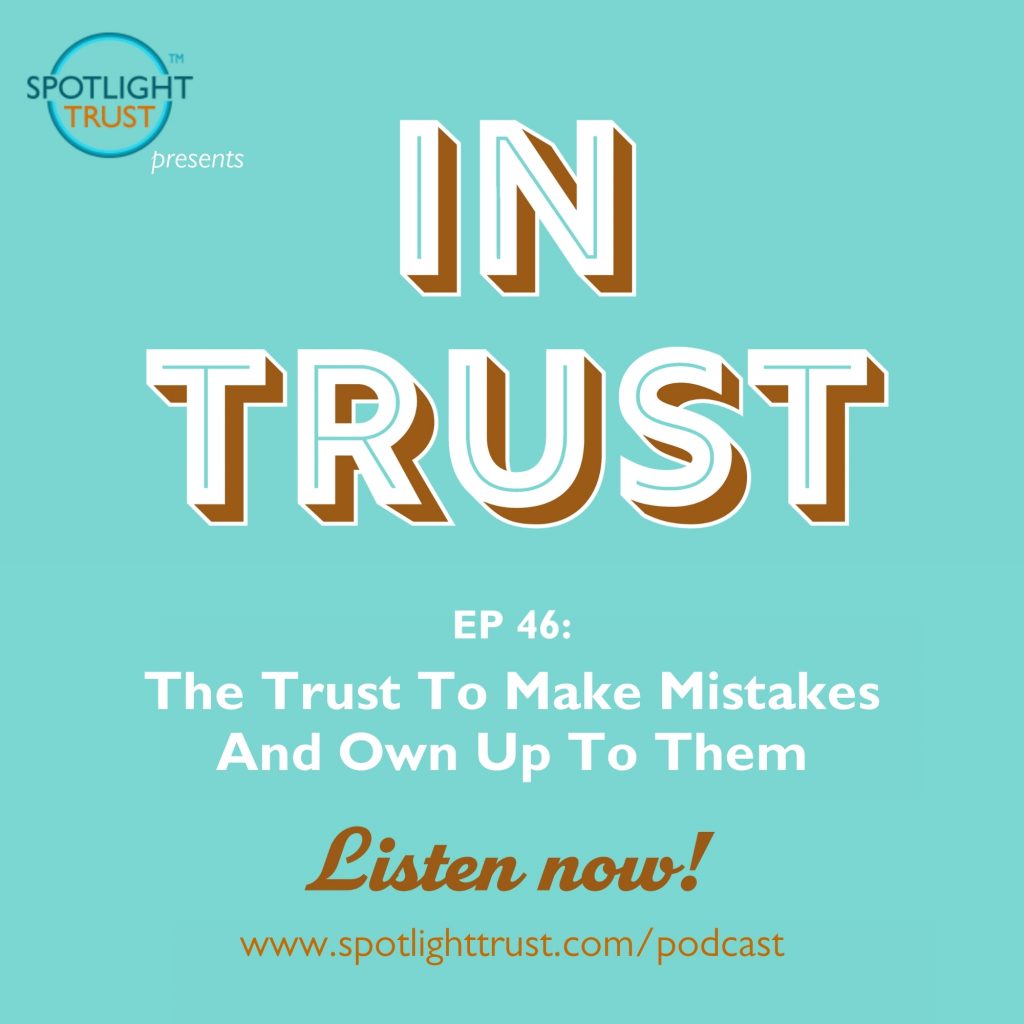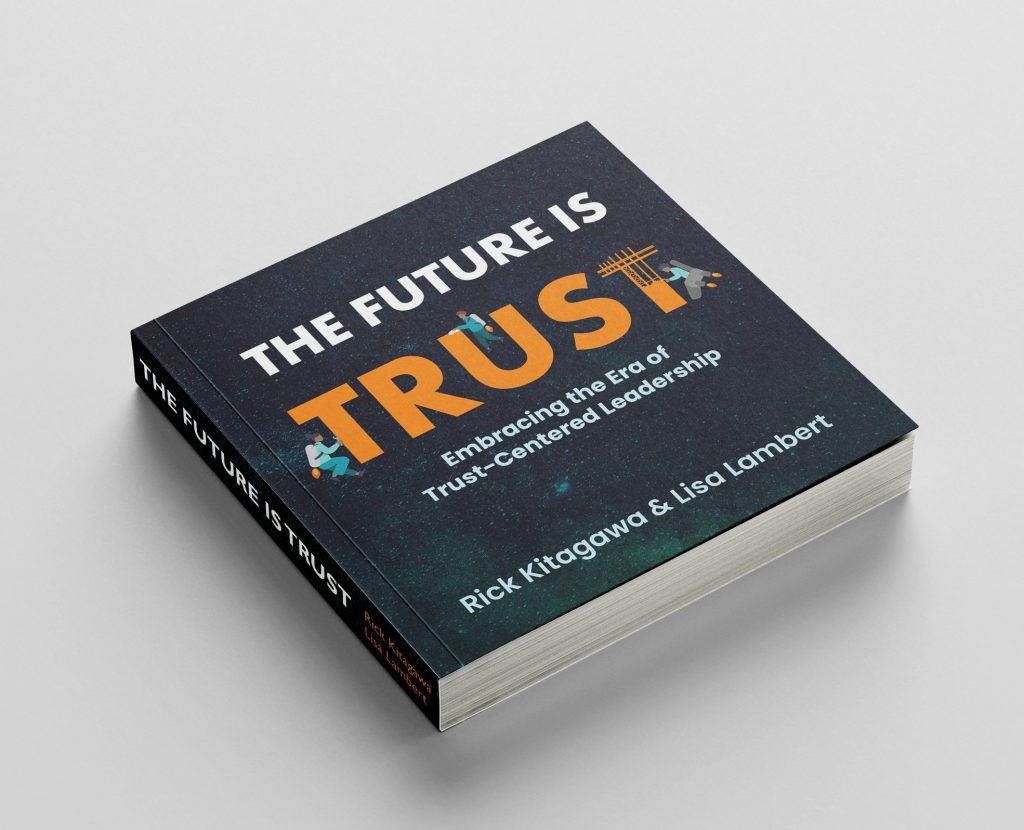Everyone makes mistakes. So how can leaders build a culture where mistakes are viewed as learning opportunities that strengthen trust and propel innovation?
In this episode of the In Trust podcast, your trusted co-hosts, Spotlight Trust Co-Founders and Co-CEOs Rick Kitagawa and Lisa Lambert, dig into the human act of making mistakes at work. They explore how leaders can collaborate with their teams to build the trust and psychological safety needed to do innovative work that may lead to mistakes and co-create a culture where people take accountability and embrace learning opportunities.
If you want to get better at making mistakes and owning up to them, you won’t want to miss this episode.
Overview of Episode 46: The Trust To Make Mistakes And Own Up To Them
Talking Points
- Making mistakes is particularly scary when one or two things are at play
- Mistakes as opportunities to rethink and learn
- Mistakes that result from mistake paralysis
- How leaders might reinforce a culture of fear and low psychological safety
- The relationship between fear, psychological safety, and accountability at work
- How do we build a culture where we make it easier to make mistakes and talk about them
- The importance of talking about almost mistakes and using almost mistakes as design cues
- Celebrating people who bring up problems
- The problem with the saying, “Don’t bring me problems without bringing me solutions.”
- The importance for leaders to practice confident humility and taking accountability for their mistakes
- The problem with white knights and superhero leaders in the workplace
- How responding to mistakes well – both your own and those of others – can build trust
- Moving from who and what caused the problem to how to solve the problem
- How fear of making mistakes and owning up to mistakes can stifle innovation
- Practical tips to build a high-trust culture where mistakes move the organization forward
Quotables
“Making mistakes is particularly scary when one or two things are at play. The first is when the cost or the risk of making a mistake is really high, whether that’s in terms of causing harm, financial cost, time, attention, or eroding trust. The second is when the cost of owning up to making a mistake is high, which is something many people experience at work given their organizational culture.” – Lisa Lambert
“The culture of the organization or the context of the situation really informs whether or not someone feels the psychological safety needed to be able to own their mistake or admit that something went wrong.” – Rick Kitagawa
“Are mistakes viewed as being failure or feedback?” – Lisa Lambert
“It’s also a mistake when we’re too scared to give something a try. We never try because we’re stuck in this mistake paralysis.” – Lisa Lambert
“Mistake paralysis: the fear of messing up that prevents you from actually doing anything that is meaningful or worthwhile or innovative.” – Rick Kitagawa
“What are the systems and what are the pitfalls that leaders fall into that keep reinforcing this culture of fear and lack of psychological safety?” – Rick Kitagawa
“Lack of psychological safety and a culture of fear have a strong relationship with accountability because if you’re really scared to make a mistake, when you do make a mistake—which will happen at some point as we all make them—it’s really scary to fess up to them. So some of the places where we see accountability being shirked is often places where it’s pretty scary to make a mistake and get caught.” – Lisa Lambert
“A lot of times almost mistakes happen or near misses happen and we’re just kind of like, “Phew! Okay, that wasn’t catastrophic.” Those almost mistakes are learning opportunities if we talk about them. A lot of mistakes happen because a lot of almost mistakes happened before them and nobody talked about them.” – Lisa Lambert
“Almost mistakes can be viewed as design cues. Is it that yout system works and it prevented this near miss or is it actually that you just got lucky this time and somehow managed to catch it? And if that latter option is actually true, then you probably should be reevaluating the system that you’re working through in order to build more resilience against those types of almost mistakes and prevent them from becoming mistakes.” – Rick Kitagawa
“It’s very disheartening and trust eroding when you have a leader say, “We are a company that is about X,” and then all of their behavior shows the complete opposite to that.” – Rick Kitagawa
“You can have a team where everyone is a leader because everyone is truly collaborative. They’re sharing the responsibility. As well as the accountability and they’re taking turns moving forward depending on the circumstance.” – Rick Kitagawa
“Leaders making mistakes and responding in a trustworthy way and trust building way is a great reframe or turnaround from this idea of a mistake being something bad to really it being an opportunity to solidify your leadership even further.” – Rick Kitagawa
“It’s scary to go try something new where you probably are going to make mistakes if it feels a lot safer to just do the same old proven thing where the risk seems significantly lower, but that doesn’t necessarily lead to moving the organization forward.” – Lisa Lambert
Show Notes
In Trust podcast episode: Designing a Sustainable Work Experience You’re Excited About – Interview with Dr. Ainsley McCaskill
This episode sponsored by:
The Future Is Trust
Embracing the Era of Trust-Centered Leadership
There’s a lot of uncertainty about the future, but one thing we are sure about is that The Future Is Trust. Which also happens to be the title of our new book.
The Future is Trust: Embracing the Era of Trust-Centered Leadership is available now!
We are so excited to bring this reimagination of what a leadership book can be.
Go to thefutureistrust.com to order your copy.







